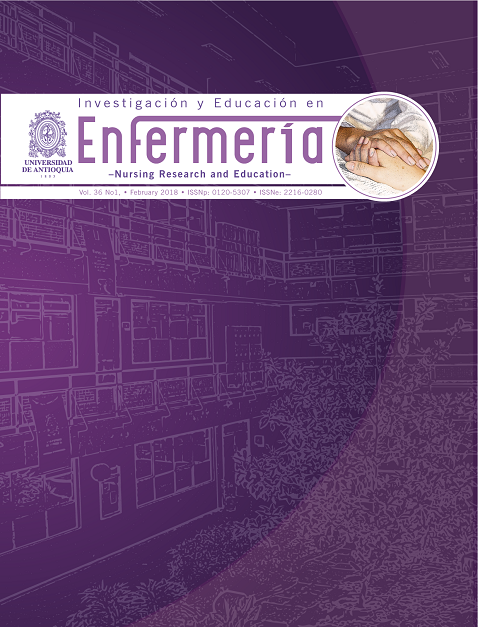Predictors of Organizational Commitment in Nursing: Results from Portugal
DOI:
https://doi.org/10.17533/udea.iee.v36n1e14Keywords:
Hospitals, public, motivation, nursing, supervisory, nursing staff, hospital, social support, Portugal.Abstract
Objective. This work sought to assess the predictor role of work engagement and social support from the supervisor and coworkers on affective commitment with the organization in nursing staff from southern Portugal.
Methods. A cross-sectional study was conducted with participation from 215 nursing professionals from three public hospitals in southern Portugal.
Results. Of the respondents, 77.21% were women. Statistically significant and positive correlations were observed between affective organizational commitment and the three dimensions of engagement: vigor (r=0.48), dedication (r=0.49), and absorption (r=0.48). Likewise, support from the supervisor and support from coworkers were positively related with affective commitment (r=0.45 and r=0.24, p<0.01). The linear and hierarchical regression model showed the following significant predictors: support from the supervisor (beta=0.28), vigor (beta=0.26), and absorption (beta=0.17).
Conclusion. Social support from the supervisor and work engagement (vigor and absorption) are important determinants of the affective bond of nursing professionals with their health organizations. Training and formation of the supervisors in leadership and coaching styles, and labor resources at work would permit increasing the levels of affective commitment in the health units.
How to cite this article: Orgambídez A, Almeida H. Predictors of Organizational Commitment in Nursing: Results from Portugal. Invest. Educ. Enferm. 2018; 36(2):e14.
Downloads
References
(1) Aiken LH, Sermeus W, Van den Heede K et al. Patients safety, satisfaction, and quality of hospital care: cross sectional survey of nurses and patients in 12 countries in Europe and the United States. BMJ. 2012; 344:e1717.
(2) Liou SR. An analysis of the concept of organizational commitment. Nurs. Forum. 2008; 43:116-25.
(3) Meyer JP, Allen NJ, Smith JC. Commitment to Organizations and Occupations: Extension and Test of a Threecomponent conceptualization. J. Appl. Psychol. 1993; 78:538-51.
(4) García-Sierra R, Fernández-Castro J, Martínez-Zaragoza F. Work engagement in nursing: An integrative review of the literature. J. Nurs. Manag. 2015; 24:E101-E111.
(5) Simpson MR. Engagement at work: A review of the literature. Int. J. Nurs. Stud. 2009; 46:1012-24.
(6) Schaufeli WB, Salanova M, González-Romá V, Bakker AB. The measurement of engagement and burnout: A two sample confirmatory factor analytic approach. J. Happiness Stud. 2002; 3:71-91.
(7) Schaufeli WB, Bakker AB. Job demands, job resources, and their relationships with burnout and engagement: A multi-sample study. J. Organ. Behav. 2004; 25:293-315.
(8) Beukes I, Botha E. Organizational commitment, work engagement, and meaning of work of nursing staff in hospitals. S. Afr. J. Ind. Psychol. 2013; 39:1-10.
(9) Brunetto Y, Xerri M, Shriberg A, Shacklock K, Newman S, Dienger J. The impact of workplace relationships on engagement, well-being, commitment and turnover for nurses in Australia and the USA. J. Adv. Nurs. 2013; 69:2786-99.
(10) Santos A, Chambel MJ, Castanheira F. Relational job characteristics and nurses’ affective organizational commitment: The mediating role of work engagement. J. Adv. Nurs. 2016; 72:294-305.
(11) Martín-Arribas MC. Estrés relacionado con el trabajo (modelo de demanda-control-apoyo social) y alteraciones en la salud: Una revisión de la evidencia existente. Enferm. Intensiva. 2007; 18:168-81.
(12) Karasek R, Theorell T. Healthy work. Stress, productivity, and the reconstruction of working life. New York: BasicBooks; 1990.
(13) Chu C-I, Lee M-S, Hsu H-M. The impact of social support and job stress on public health nurses’ organizational citizenship behaviors in rural Taiwan. Public Health Nurs. 2006; 23:494-505.
(14) El Akremi A, Colaianni G, Portogjese I, Galletta M, Battistelli A. How organizational support impacts affective commitment and turnover among Italian nurses: A multilevel mediation model. Int. J. Human Resour. Manag. 2014; 25:1185-207.
(15) Leiter MP. Commitment as a function of stress reactions among nurses: A model of psychological evaluations of work settings. Can. J. Commun. Ment. Health. 2009; 7:117-33.
(16) Rousseau V, Aubé C. Social support at work and affective commitment to the organization: The moderating effect of job resource adequacy and ambient conditions. J. Soc. Psychol. 2010; 150:321-40.
(17) Salami S. Mentoring and work attitudes among nurses: The moderator roles of gender and social support. Eur. J. Psychol. 2010; 6:102-26.
(18) Cohen J. Statistical power analysis for the behavioral sciences. Hillsdale, NJ: Erlbaum; 1988.
(19) Orgambídez A, Almeida H. Work engagement, social support, and job satisfaction in Portuguese nursing staff: A winning combination. Appl. Nurs. Res. 2017;36:37-41.
(20) Navas JM. Métodos, diseños y técnicas de investigación psicológica. Madrid: UNED; 2002.
Downloads
Published
How to Cite
Issue
Section
License
Derechos de propiedad / Direitos de Propriedade
English: If the article is accepted for publication, all copyright will be of exclusive property of Investigación y Educación en Enfermería. The text and the graphics included in the publication are exclusive responsibility of the authors and not necessarily reflect the thought of the Editorial Committee.
Español: Si el artículo es aprobado para publicación, todos los derechos son de propiedad de Investigación y Educación en Enfermería. El texto y las gráficas incluidas en la publicación son de exclusiva responsabilidad de los autores y no necesariamente refleja el pensamiento del Comité Editorial.
Português: Se o artigo for aceito para publicação, todos os direitos autorais serão de propriedade exclusiva de Investigación y Educación en Enfermería. O texto e os gráficos incluídos na publicação são de responsabilidade exclusiva dos autores e não refletem necessariamente o pensamento do Comitê Editorial.















